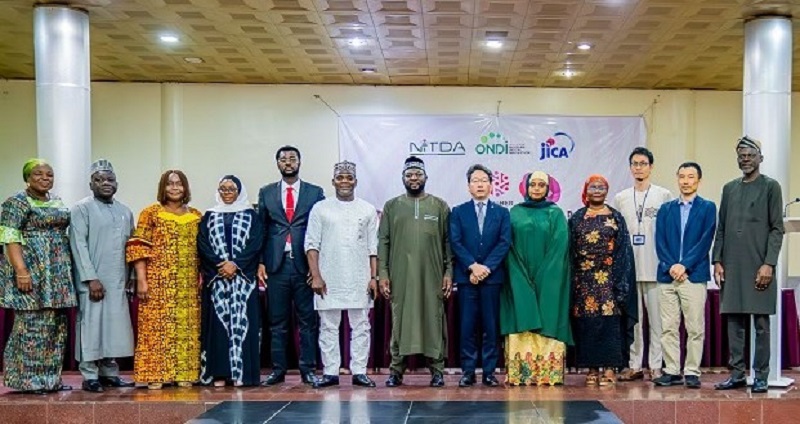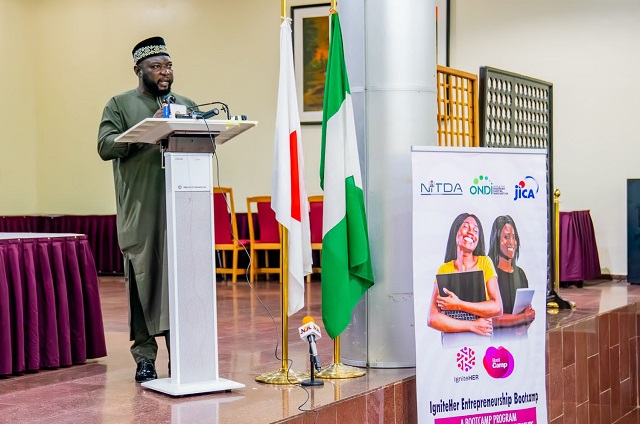In a resounding affirmation of its commitment to President Bola Ahmed Tinubu’s Renewed Hope Agenda, the National Information Technology Development Agency (NITDA) has unveiled the second cohort of the IgniteHer Bootcamp for Women Entrepreneurs.
Digital TimesNG understands that the initiative, which champions gender inclusion and economic empowerment through digital innovation, is being executed in partnership with the Japan International Cooperation Agency (JICA).
Themed “Empowering Women Entrepreneurs for Growth and Innovation,” the bootcamp brings together selected women entrepreneurs from across Nigeria, both in person and online, for intensive training in digital skills, innovation management, business development, and investor readiness.
Declaring the bootcamp open, NITDA Director General, Kashifu Inuwa, reiterated the agency’s dedication to aligning Nigeria’s digital development with national priorities focused on economic reform, inclusive growth, and diversification through industrialisation and digitisation.
“Through IgniteHer, we are actualising President Bola Ahmed Tinubu’s Renewed Hope Agenda by expanding women’s access to technology and economic opportunity,” he said.

Represented by the agency’s Acting Director of the Digital Literacy and Capacity Building department, Dr. Ahmed Tambuwal, Inuwa emphasised that inclusive innovation remains a cornerstone of NITDA’s Strategic Roadmap and Action Plan (SRAP 2.0: 2024–2027).
This, he noted, aligns with national goals for inclusive growth, poverty eradication, and youth empowerment. “We are not merely imparting skills; we are creating self-reliant entrepreneurs, change-makers, and leaders,” he added.
Inuwa further disclosed that the IgniteHer Bootcamp is a central component of the National Gender Digital Inclusion Strategy (NGDIS), through which NITDA aims to empower 12.7 million Nigerian women with digital literacy skills by 2027.
He described the programme as a valuable complement to broader government efforts to close gender gaps, enhance productivity, and tackle unemployment—particularly among young women.
Referencing a report by the World Wide Web Foundation, Inuwa highlighted the economic value of digital gender inclusion, noting that closing the digital gender gap in Nigeria could unlock an estimated $13 billion in GDP growth over the next decade.
“This training is a step towards harnessing this economic potential and ensuring that women play an integral role in shaping the digital landscape of Nigeria,” he stated, urging the selected participants, chosen from over 12,000 applicants, to seize the opportunity and become architects of a new entrepreneurial future.
Commending JICA and the Government of Japan for their enduring partnership, Inuwa highlighted NITDA’s leadership in fostering strategic collaborations, and pointed to ongoing joint initiatives such as IgniteHer and the iHatch Incubation Programme, which offers startup support, mentorship, and innovation development to early-stage entrepreneurs.
“At NITDA, we believe that inclusive innovation is not just an ideal but a critical strategy that ensures the growth of a stronger economy, the development of smarter solutions, and the existence of more resilient communities. Through IgniteHer, we are dismantling barriers and replacing them with pathways to opportunity,” he concluded.
Also speaking at the event, the Japanese Ambassador to Nigeria, Matsunaga Kazuyoshi, reaffirmed Japan’s enduring support for innovation and gender inclusion in Nigeria, and revealed that Japan, through JICA, is currently backing two major grant projects worth $30.9 million aimed at enhancing Nigeria’s startup ecosystem, improving the investment climate, and developing an inclusive innovation hub.
Kazuyoshi also referenced the forthcoming Tokyo International Conference on African Development (TICAD 9), themed “Co-create Innovative Solutions with Africa”, as another example of Japan’s dedication to deepening Africa-Japan ties in digital transformation and entrepreneurship.
In her remarks, Lead Facilitator of IgniteHer, Hajiya Hafsat Salabi-Dange, described the programme as a powerful driver of social and economic transformation.
Applauding NITDA’s visionary development agenda, she called the initiative “a movement” that is bridging the digital gender divide and promoting economic self-reliance among women.
Urging participants to embrace the journey with curiosity, purpose, and courage, she said, “What you will gain here goes beyond business; it is a tool for community upliftment, national growth, and generational impact.”

